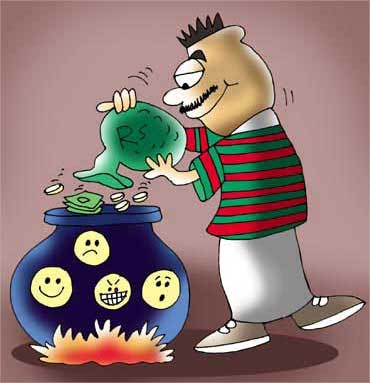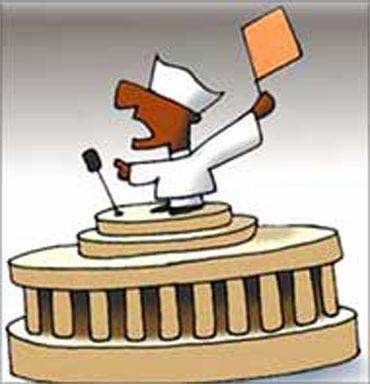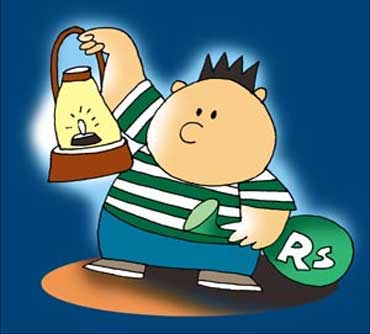Photographs: Illustrations: Uttam Ghosh/Rediff Sahim Salim in New Delhi
Corporate India believes that India can achieve more that the projected 9 per cent GDP growth if corruption can be controlled, says a new survey.
The recent string of financial scams exposes has brought evidence of rampant corruption in India to the fore and corporate India believes that this will directly impact the performance of stock markets and thus prevent institutional investors from making long term investments.
The survey, titled 'Survey on Bribery and Corruption', reveals that 99 per cent of respondents believed that the biggest impact of corruption business was its tendency to skew the level playing field and attract organisations with lesser capacity to execute projects.
"We conducted a survey by keeping three key points in mind - the impact of corruption on the Indian economy, its impact on business and effectiveness of anti corruption legislature currently available in India.
Interestingly, in the legislature, corporate India has voted the Right to Information Act (2005) as the most effective initiative in fighting corruption," Rohit Mahajan, executive director, KPMG-India Forensic service told rediff.com.
...
With less corruption, India can grow over 9%
KPMG sent out the surveys to over 300 companies in India and received responses from 100.
Respondent companies included MNCs, Indian MNCs and domestic firms from varied fields like financial services (25 per cent), information technology and media (18 per cent), legal (12 per cent), healthcare (7 per cent) and several others.
"In the budget speech, the Finance Minister said that controlling corruption is a key agenda for the government. But despite several measures like the Central Vigilance Commissions and the Right to Information Act, over 50% of the respondents believe that the corruption level will remain the same in the next two-three years," Deepankar Sanwalka, KPMG-India's Risk and Compliance head told rediff.com.
"Corporates cannot claim to be a victim of corruption. If corruption exists, it is also because of them. People who resort to bribes are as much responsible for the rampant corruption in India.
According to our survey, India ranks 87th out of 187 countries in Corruption Perceptions Index. India's Integrity Score on a scale of 10 stands at 3.3, which is barely even passing marks," Anupama Jha, executive director, Transparency International India, who was at the launch, said.
...
With less corruption, India can grow over 9%
According to the survey, 97 per cent of the respondents believe that corruption will affect the overall investments scenario in India.
Fifty one per cent of these believe that India will attract lesser quantum of overall investments than its peers owing to corruption, while 46 per cent believe that India will attract investments only in selective sectors resulting in skewed growth.
Forty-six per cent of the respondents said that corruption in India will remain at the same level in the next two years, while 33 per cent responded saying it can drop by upto 25 per cent.
...
With less corruption, India can grow over 9%
Only one per cent believed corruption will drop by more than 50 per cent.
"The good news is that corruption has reached its zenith. India has witnessed a rapid growth in its middle class over the last decade.
There is no place for the guilty to hide anymore. The middle class and civil society have evolved. There are three stages in corruption - the first is stagnant and inefficient, the second phase is expanding and efficient, while the third is the declining phase.
In my personal opinion, India is at the third stage right now. If you question the supply side of corruption, the demand side will automatically be reduced," economist Surjit Bhalla said.





article